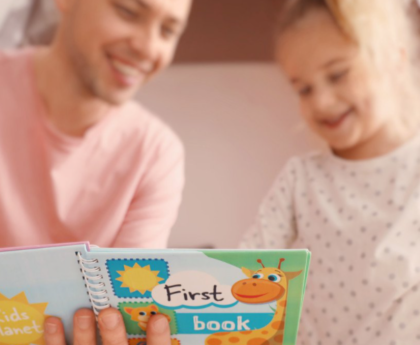One question that parents often ask teachers is how to choose the best children’s books for their child to read. The answer to this question can vary by age or grade, but one thing is certain: to help your children improve their reading skills, you want them reading books that are at their appropriate reading level. Books that are at their instructional reading level ensure that your child is being challenged appropriately without the reading being too difficult. When children spend time reading or being read to, they improve their phonemic awareness, vocabulary, comprehension, and fluency, as well as their cognitive development, concentration, creativity, and social and emotional development. They also make noticeable academic gains. In fact, research shows that there is a strong correlation between how much a child reads or is read to and his or her acquisition of words, and this leads to greater performance on standardized tests.
How do you determine your child’s reading level and find appropriate leveled books that your child will find interesting? There are tools and sites that can help with this, and the following guidance can help you navigate finding books that are “just right” for your child.
What are reading levels and why are they used?
A reading level is a scale-based measurement of where a child is reading instructionally. They are used to help teachers and schools provide the appropriate reading materials, lessons, and supports for students, as well as to help children select books that they can read on their own that will appropriately challenge them. Reading levels can be a better measurement for choosing books than reading books by grade level or age because developing reading skills is a continuum, and children develop these skills at different rates.
How do you determine a child’s reading level, and why do these levels differ?
Schools use a variety of assessments to measure a student’s academic performance and growth in reading. Formal assessments, like standardized tests, are norm-based and give a percentile measure for how a child compares to others in the same age range. Some also give reading levels by grade. For example, a child reading at the 90th percentile scored better on the assessment than 90% of same-aged peers that took the same test. And a child that scored at a grade 3.5 is reading at a mid-3rd grade level. These tests are also a diagnostic tool that address specific skills in reading. Informal assessments include quick screeners and progress-monitoring. These are used by individual schools to help determine a child’s reading level and specific academic needs so they can be placed in the appropriate guided reading group. These assessments depend on the curriculum utilized by an individual school or district, and the levels can vary. The results of these assessments are for school use and are not norm-referenced.
Many formal assessments give a Lexile level to determine an individual student’s reading ability. The Lexile Framework uses a scientific approach to reading and measures the difficulty level of a text as well as a student’s reading ability on a scale. This framework measurement helps readers choose books by their Lexile level. Another scaled measure of readability is the ATOS, which was designed by Renaissance Reading to level their Accelerated Reader books. The ATOS scale levels books by grade level, so books with a level 4.1 are written for students with a reading level comparable to that of a student in the first month of 4th grade.
Schools may also rely on different research-based reading programs or assessments to determine a child’s reading level. They all use slightly different leveling systems. For example, The Development Reading Assessment (DRA) scores students on a range from 1-80, Reading A-Z and Fountas & Pinnell assign levels from A-Z (though these levels don’t fully align after level J), and Reading Recovery uses numbered levels from 1-40. The assessment or program that an individual teacher or school uses doesn’t make a difference as long as teachers use a consistent measurement within their class. Teachers use reading levels to group their students, identify those that need additional interventions, and track their progress. The leveling scale used can change year to year or teacher to teacher.
How do reading levels correlate to grade levels or to other leveled reading programs?
Due to the variety of assessments and measurements available, knowing your child’s reading level and how that level compares to grade level text can be confusing. Fortunately, there are resources and conversion charts to help with this. The first step is to talk with your child’s teacher to find out what reading measurement is used and what level books your child should be reading. Once you have an indication of your child’s reading level, then you can search for books based on the information you have. A librarian can also help you identify books that are at the appropriate level for your child. To see how reading levels match up between various programs and assessment scales, you can find reading level correlation charts for most curriculum or assessments being used. There are reading level grade charts for Lexile levels, F&P reading levels, Reading Recovery levels, ATOS book levels, Reading A-Z texts, Scholastic guided reading levels, Follett levels, or a conversion chart that shows multiple leveling systems and grade level ranges. There is some controversy around using instructional leveling systems, particularly when they are used too strictly and limit a child’s access to grade-level texts by allowing them to get “stuck” at a lower instructional reading level. Leveling systems should never be used to restrict what books kids are given to read or exposed to, but rather as a starting point. The goal should always be to provide appropriate scaffolding so that children can stretch their skills and get to grade-level if they’re currently below.
What are recommended books based on my child’s reading level?
There are several book level finder tools available online to help find the best leveled children’s books based on a variety of factors, including reading level, grade level, interest, topic, or popularity.
Lexile Find a Book: Find a book based on Lexile level, Lexile range, F&P level, age, or grade level.
Teacher recommended book lists: Search books by grade level or get recommended grade level reading lists, top 10 lists, or series picks.
Reading Rockets Book Finder: Search books by age, reading level, genre, topic, or format, or check out the themed book lists, award winning books, or tips for how to choose kids’ books.
AR Bookfinder: If you click advanced search, you can search the Accelerated Readers book list by reading level, interest level, or topic. You can also look for books under Collections.
Best Children’s Books by Lexile Level: Created by teachers, this site allows you to search for books based on reading level, topic, or academic area.
Goodreads Children’s Books – Browse books by age group/genre to view new releases, most read, or book lists.
Amazon Children’s Book Search – Search books by age, Lexile level, type, topic, category, or check out recommendation picks.
Free Online Books
Check with your school or library to see if they have access to an online or audio book subscription site like Epic or Learning Ally. You can also find free online book sites that don’t need a subscription, but most of these have a limited selection or contain pop-up ads.
Books read out loud:
Uniteforliteracy.com (Nonfiction books)
Books by age, grade, subject, or style:
Books by guided reading level or skill:





